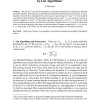Free Online Productivity Tools
i2Speak
i2Symbol
i2OCR
iTex2Img
iWeb2Print
iWeb2Shot
i2Type
iPdf2Split
iPdf2Merge
i2Bopomofo
i2Arabic
i2Style
i2Image
i2PDF
iLatex2Rtf
Sci2ools
131
click to vote
ALGORITHMICA
1999
1999
A Note on the Expected Time for Finding Maxima by List Algorithms
Maxima in Rd are found incrementally by maintaining a linked list and comparing new elements against the linked list. If the elements are independent and uniformly distributed in the unit square [0, 1]d , then, regardless of how the list is manipulated by an adversary, the expected time is O(n logd-2 n). This should be contrasted with the fact that the expected number of maxima grows as logd-1 n, so no adversary can force an expected complexity of n logd-1 n. Note that the expected complexity is O(n) for d = 2. Conversely, there are list-manipulating adversaries for which the given bound is attained. However, if we naively add maxima to the list without changing the order, then the expected number of element comparisons is n + o(n) for any d 2. In the paper we also derive new tail bounds and moment inequalities for the number of maxima. Key Words. Outer layers, Maxima, List algorithms, Expected time, Randomized algorithms, Probabilistic analysis.
Related Content
| Added | 22 Dec 2010 |
| Updated | 22 Dec 2010 |
| Type | Journal |
| Year | 1999 |
| Where | ALGORITHMICA |
| Authors | Luc Devroye |
Comments (0)

